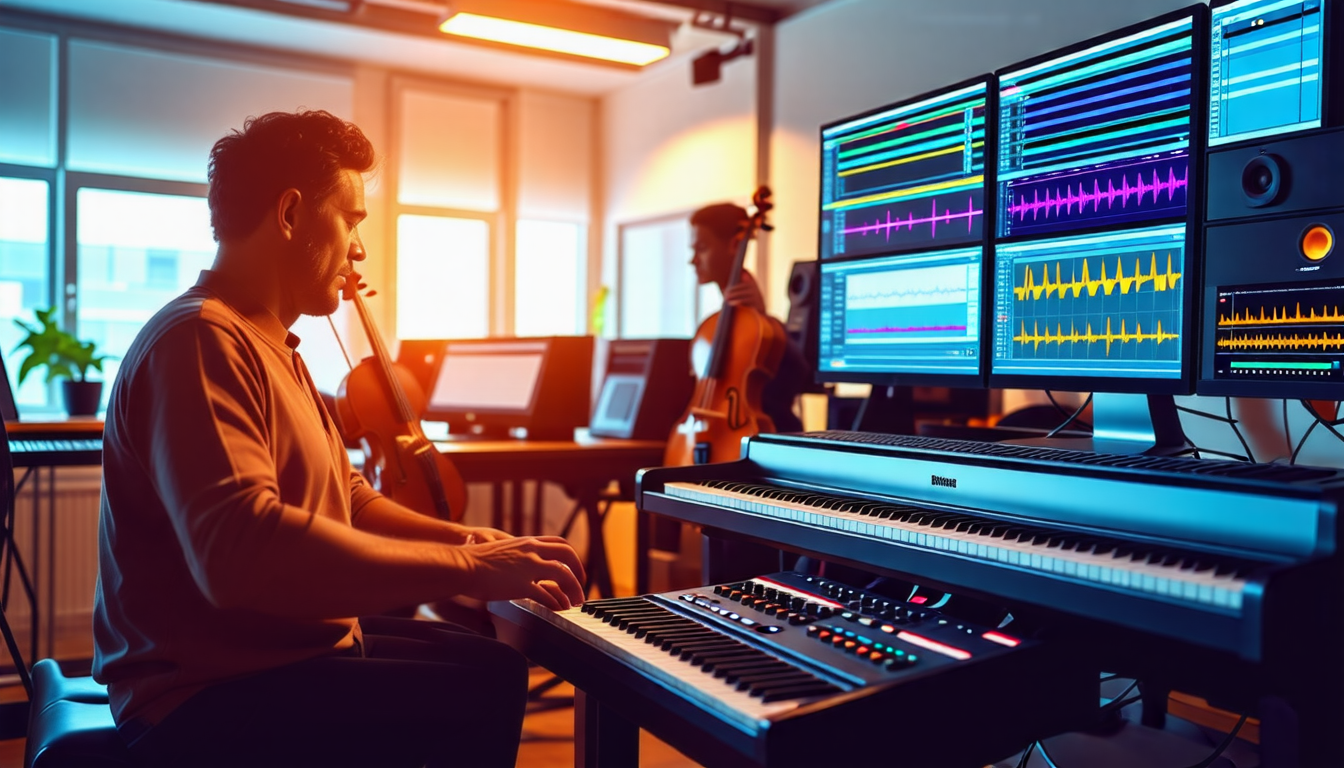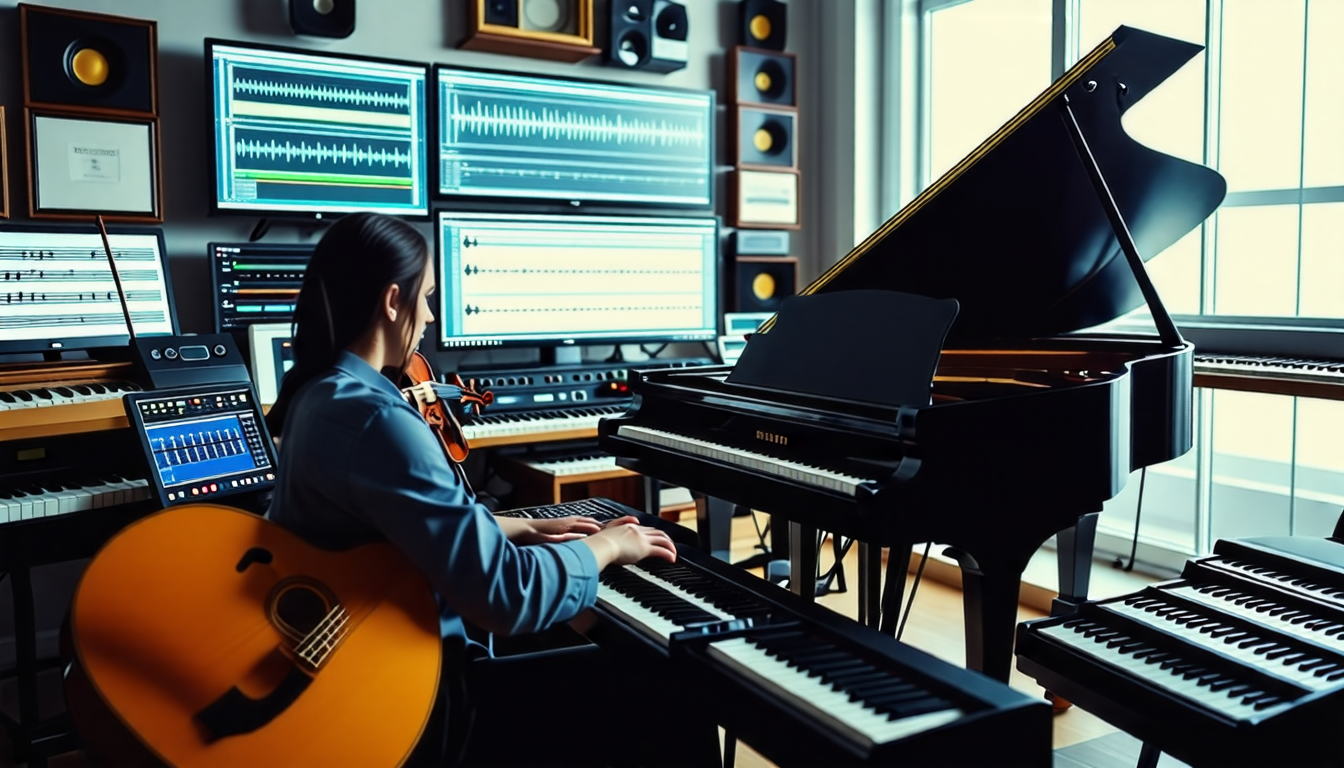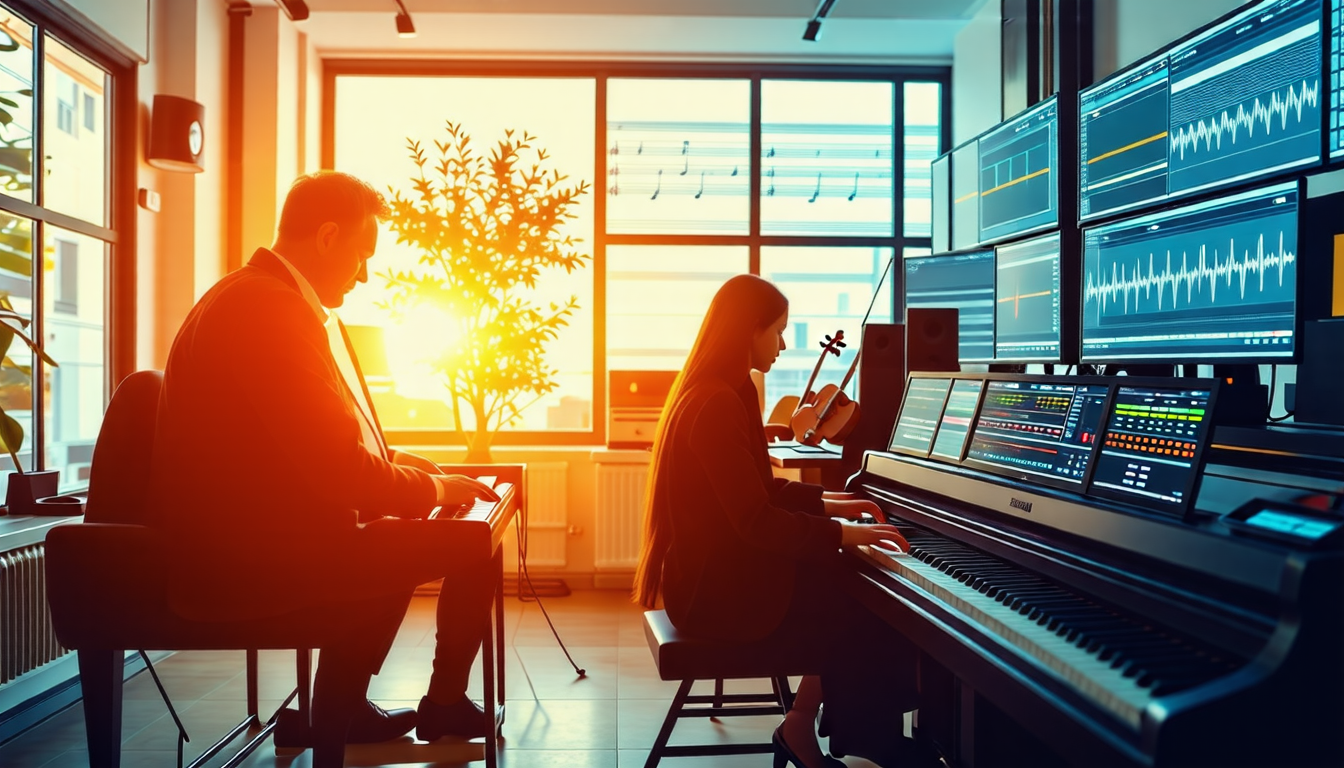|
IN BRIEF
|
In the ever-evolving landscape of music composition, software plays a pivotal role in redefining the creative process. With the advent of advanced audio mixing and mastering software, musicians can significantly streamline their workflow, allowing them to focus on their artistic vision rather than getting bogged down in technical details. These tools offer intuitive interfaces and user-friendly controls, making it easier for artists to translate their ideas into auditory experiences. Moreover, the integration of artificial intelligence in composition tools provides a new avenue for innovation, enabling composers to explore original concepts and experiment with diverse genres. By harnessing technology, composers can deepen their understanding of music theory while preserving the essence of their musical voice, enhancing their ability to create captivating scores that resonate with listeners.

In today’s digital age, software plays an integral role in transforming the way music is composed and produced. The evolution of music composition software has not only streamlined the creative process but has also enriched the composer’s toolkit with numerous features that foster innovation and exploration.
The Evolution of Music Composition Software
Initially, music composition was a manual endeavor, requiring knowledge of music theory, traditional notation, and often, extensive practice. However, with the advent of software such as Sibelius and Finale, composers now have the ability to translate their ideas into notation with greater accuracy and efficiency. These tools allow for immediate playback of compositions, which enables composers to hear their works as they develop them, a significant advantage over the traditional pen-and-paper method.
Benefits of Notation Software
Using notation software offers numerous benefits that enhance creativity and streamline the composing process. For instance, these programs simplify the creation of complex scores, allowing composers to focus on creativity rather than logistics. Features such as drag-and-drop interface design mean that arrangements can be shifted easily, helping to visualize the overall structure of the composition.
Enhancing Collaboration
Collaboration plays a crucial role in music composition, and software can significantly enhance this aspect. Platforms like MuseScore and Logic Pro facilitate seamless sharing between composers. The ability to annotate scores digitally improves communication, enabling real-time feedback and revisions. Moreover, these platforms support various file formats, simplifying the collaboration with musicians who may be using different systems.
The Role of AI in Music Composition
With the rise of artificial intelligence, the realm of music composition has been revolutionized. AI algorithms analyze existing works to generate original musical ideas, assisting composers in overcoming creative blocks. By incorporating AI-generated suggestions, composers can explore new genres and styles that they might not have considered, pushing the boundaries of their creativity.
Exploring New Musical Concepts
Digital composition tools often include algorithm-based capabilities that allow musicians to experiment with randomness and structure. This kind of software enables composers to explore new melodic and harmonic ideas that can be unexpected yet rewarding. By embracing this uncertainty, musicians can step outside their comfort zone, which in turn stimulates originality and innovation in their compositions.
Mixing and Mastering Made Easy
Once a composition is complete, mixing and mastering software become vital components of the music production process. Programs like Ableton Live and Pro Tools provide a wealth of tools for refining sound quality, enhancing dynamic range, and balancing frequencies. These platforms have made it easier for composers to produce polished tracks without needing extensive knowledge of audio engineering.
Using Digital Audio Workstations (DAWs)
Digital Audio Workstations, or DAWs, are at the forefront of music composition software, offering a comprehensive environment for writing, recording, and producing music. The intuitive interfaces of DAWs allow composers to easily manipulate sounds, arrange tracks, and apply effects. This flexibility enables composers to work across different genres, resulting in a more profound and versatile musical output.
Accessibility and Affordability of Music Software
The accessibility of affordable music software has democratized music composition. With numerous free or low-cost tools available, aspiring composers can experiment without financial pressure. This inclusivity encourages a diverse range of voices to contribute to the music landscape, fostering a richer tapestry of creativity within the industry.
Learning and Skill Development
Software tools come equipped with tutorials and resources, making it easier for musicians to learn. As users engage with these programs, they develop essential musical skills that can improve their craft. This hands-on approach often leads to a deeper understanding of music theory, composition techniques, and sound design principles, further enriching their musical vocabulary.
Community and Online Collaboration
The online music community thrives on platforms that allow for collaboration and sharing. Websites dedicated to music composition facilitate interaction between musicians, providing forums for feedback, idea sharing, and resources. This interconnectedness fosters a supportive environment that encourages artists to push their creative limits.
Choosing the Right Software
As mentioned, selecting the right software is essential for enhancing the music composition process. When deciding what to use, consider factors such as user interface, compatibility with existing tools, and the specific needs of your projects. You can gain insights into available features through resources that explore what to consider when choosing music software. Understanding these aspects ensures that composers can leverage the full potential of their software, maximizing their creative output.
Future Trends in Music Composition Software
The future of music composition software is bright, with trends suggesting further integration of machine learning and enhanced user interfaces. Anticipated advancements include more sophisticated AI that can learn individual user preferences and habits, thus providing tailored suggestions and features. Additionally, as virtual reality technology advances, there is potential for immersive music creation experiences that could transform the way artists interact with their compositions.
In summary, the marriage of technology and music composition opens new avenues for creativity and efficiency. By embracing innovative software solutions, musicians can elevate their craft and explore uncharted territories in musical expression. Enhanced collaboration, improved accessibility, and sophisticated tools have solidified software’s indispensable role in the art of music composition.

Software plays a pivotal role in enhancing the art of music composition, offering tools that streamline the creative process. With intuitive interfaces and robust features, composers can focus on their artistic vision while leveraging technology to handle complex tasks such as audio mixing and mastering. Programs like MuseScore and Finale enable musicians to visually manipulate their ideas, facilitating a more efficient workflow. Moreover, AI algorithms assist in generating innovative musical ideas, allowing composers to explore previously uncharted territories in their work. The integration of such advanced software not only fosters creativity but also enhances collaboration among artists, ultimately pushing the boundaries of what is possible in music creation.
Frequently Asked Questions About Software Enhancing Music Composition
What role does software play in music composition? Software plays a crucial role in music composition by providing tools that streamline the creative process, enabling composers to focus more on their artistic vision rather than technical details.
How does audio mixing software improve workflow? Audio mixing software enhances workflow efficiency through intuitive interfaces and user-friendly controls, allowing artists to manipulate sound more easily and effectively.
Can composing music by hand enhance creativity? Yes, composing music by hand can improve creativity; studies suggest that manual composition fosters cognitive engagement, encouraging deeper emotional connections with the music.
What are some popular music composition software options? Popular music composition software includes tools like Sibelius, Finale, and MuseScore, each offering unique features to help composers develop their musical ideas visually.
How does AI contribute to music composition? AI contributes to music composition by utilizing algorithms and machine learning to generate musical ideas, assisting composers, and encouraging experimentation with new genres and styles.
Why do musicians prefer digital composition tools? Musicians prefer digital composition tools because they provide a range of features such as notation, editing capabilities, and real-time playback, which facilitate the composing process significantly.
How can technology assist in discovering a musical voice? Technology assists in discovering a musical voice by allowing composers to explore different sounds and arrangements digitally, broadening their creative possibilities and articulating their style more effectively.
What should composers consider when choosing music software? Composers should consider factors such as ease of use, functionality, compatibility with existing hardware, and specific features that cater to their unique composing needs when selecting music software.

